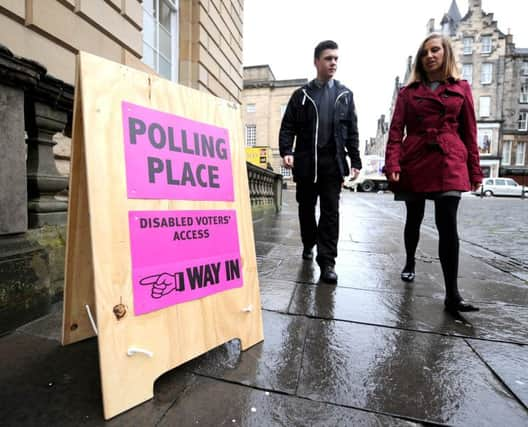Is Scotland more politically engaged than ever before?


There has been talk of a ‘new politics’ in Scotland and claims that the population at large is more engaged with the political process than ever before.
A record 84.6 per cent of the electorate cast a vote on the nation’s future on September 18 last year.
Advertisement
Hide AdAdvertisement
Hide AdTurnout at the subsequent General Election in May was down to 71.1 per cent - but this still represented the highest total since 1997.
The UK-wide turnout was 66.1 per cent.
So are more people taking an interest in politics than ever before?
“Turnout in Scotland in the General Election was higher than that in England and Wales - the first time this has happened in a very long time,” said Professor John Curtice of the University of Strathclyde.
“But by pre-1997 standards, a turnout of 71 per cent is not fantastic.”
Between 1950 and 1997, the turnout in Scotland for General Elections never fell below 70 per cent.
Two Scottish constituencies recorded the highest turnouts in the UK in May, with 81.9 per cent in Dumbartonshire East and 81.1 per cent in Renfrewshire East. Both seats were SNP gains.
The lowest in Scotland was Glasgow North East at 57 per cent - but this was still comfortably higher than the 47 per cent of voters who made their voices heard in Manchester Central.
It’s not just at the ballot box that more Scots are engaging in the political process. The SNP, Scottish Greens and Scottish Socialists all reported huge numbers of people registering as party members in the wake of the referendum in 2014.
Advertisement
Hide AdAdvertisement
Hide AdResearch by the University of Edinburgh also suggested that 16 and 17-year-olds in Scotland were more politically engaged than those elsewhere in the UK.
Two-thirds said they would have been “very likely” to have voted in the General Election given the chance, compared to 39 per cent elsewhere.
The independence referendum gave 16 and 17-year-olds a vote in a national poll for the first time. They will also be able to vote in the Scottish Parliament elections next year.
But you don’t need to visit your local polling station to be part of this new political mood.
“It’s not just voting or taking part in marches that classes as political involvement,” said Professor Ailsa Henderson, head of politics and international relations at the University of Edinburgh. “There’s a quiet element to it. That could mean people sitting at home reading about politics, whether in print or online, and considering the different arguments relating to policies.
“Scotland is more politically engaged - but there is a big caveat. Yes voters are far more likely to say that Scotland has changed or that they have become more engaged.
“No voters are far more likely to say that Scotland will return to normal and that they personally are not more engaged.”
Prof Henderson is part of the research team behind the Scottish Referendum Study, which has interviewed voters from across the country.
Advertisement
Hide AdAdvertisement
Hide AdIts preliminary results were published last October and its full report is expected by the end of the year.
Political observers will be watching the 2016 Scottish Parliament election keenly to see if the upsurge in voting continues.
Turnout for the 2011 Holyrood poll was just 50.6 per cent - a slight decrease from the 2007 figure of 53.9 per cent.
Only 35 per cent of voters in Glasgow Provan made it to the ballot box, while three other Glasgow constituencies (Maryhill and Springburn, Shettleston and Pollok saw turnouts of less than 40 per cent.